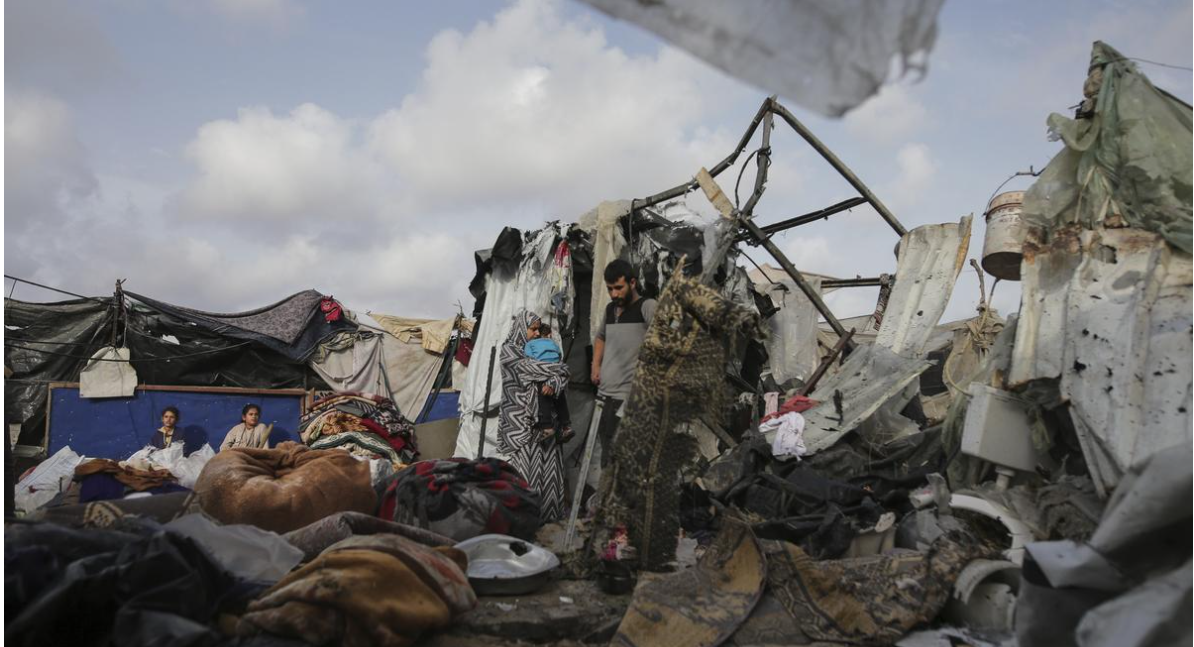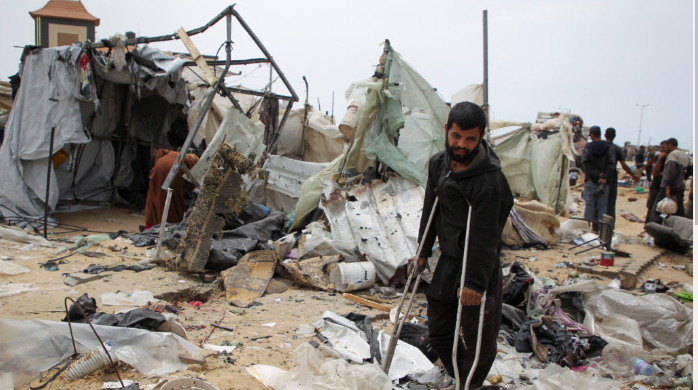Latest Israeli Strikes on Rafah Kill 37:-
Israeli Strikes In a continuation of the escalating violence in the Gaza Strip, recent Israeli airstrikes on the city of Rafah have resulted in the deaths of 37 Palestinians. This devastating attack comes just days after a series of strikes targeted tent camps, exacerbating an already dire humanitarian situation.
A Region in Turmoil
Rafah, a city located in the southern part of the Gaza Strip near the Egyptian border, has historically been a flashpoint in the Israeli-Palestinian conflict. The city is a critical entry and exit point for Gaza, and its strategic location makes it a frequent target in military operations. The recent airstrikes have once again thrust Rafah into the international spotlight, highlighting the ongoing struggles of its residents.
The attack on Rafah follows a pattern of intensified military activity in the region. Just days earlier, Israeli forces launched strikes on tent camps housing displaced Palestinians. These camps, often lacking adequate shelter and essential services, have become symbols of the broader humanitarian crisis facing Gaza. The compounded impact of these strikes has been catastrophic, further straining the limited resources available to the already beleaguered population.
The Human Cost
The latest airstrikes on Rafah have claimed 37 lives, a tragic toll that underscores the human cost of the conflict. Among the dead are men, women, and children, their lives cut short by the relentless violence. The immediate aftermath of the strikes has been marked by scenes of chaos and despair, with rescue workers and medical personnel struggling to assist the wounded and recover bodies from the rubble.
One of the most poignant stories emerging from Rafah is that of the Al-Masri family, who lost five members in the attack. The family had been gathered in their home when the airstrike hit, reducing the building to ruins. Neighbors and first responders described a harrowing scene as they worked to pull survivors from the debris.
“We heard the explosion and ran to help,” said Mohammed, a local resident. “The house was gone. There were screams, children crying. We did everything we could, but it was too late for many of them.”  for more information click on this link
for more information click on this link
A Humanitarian Crisis
The recent violence in Rafah and the broader Gaza Strip has exacerbated an already dire humanitarian situation. Gaza, home to over two million people, has been under an Israeli blockade since 2007, severely restricting the movement of goods and people. This blockade has led to widespread shortages of food, medicine, and other essential supplies.
The United Nations Relief and Works Agency (UNRWA), which provides aid to Palestinian refugees, has warned of a looming humanitarian disaster. Philippe Lazzarini, the UNRWA Commissioner-General, expressed deep concern about the escalating violence and its impact on civilians.
“The situation in Gaza is untenable,” Lazzarini said. “The recent airstrikes have only added to the misery of people who were already living in extremely difficult conditions. We urgently need access to provide humanitarian assistance and ensure the safety of civilians.”
In response to the growing crisis, international aid organizations have called for an immediate ceasefire and the opening of humanitarian corridors to allow for the delivery of aid. However, access remains severely limited, and the ongoing violence poses significant risks to aid workers on the ground.
International Reactions
The international community has reacted with a mixture of condemnation and calls for restraint. The United Nations, the European Union, and several countries, including the United States, have issued statements urging both sides to de-escalate the conflict and protect civilian lives.
UN Secretary-General António Guterres expressed his alarm over the rising civilian toll and called for an immediate cessation of hostilities. “The loss of civilian lives is deeply troubling,” Guterres said. “All parties must adhere to international humanitarian law and take all necessary measures to protect civilians.”
The European Union echoed these sentiments, with Josep Borrell, the EU’s High Representative for Foreign Affairs and Security Policy, calling for an end to the violence and the resumption of peace talks. “The cycle of violence and suffering must stop,” Borrell stated. “There can be no military solution to this conflict. Only a negotiated political solution can bring lasting peace and security to both Israelis and Palestinians.”
In the United States, President Joe Biden reiterated his support for Israel’s right to self-defense but also emphasized the importance of protecting civilian lives. “While Israel has the right to defend itself against terrorist attacks, it must do so in a manner that minimizes harm to civilians,” Biden said. “We urge all parties to work towards de-escalation and peace.”  for more information click on this link
for more information click on this link
The Road to Peace
The latest surge in violence underscores the complexity and deep-rooted nature of the Israeli-Palestinian conflict. Decades of negotiations, peace processes, and international interventions have so far failed to produce a lasting resolution. The recent attacks highlight the urgent need for renewed efforts to address the underlying causes of the conflict and find a path to peace.
Experts and analysts point to several key factors that must be addressed to achieve a sustainable solution. These include:
- Ending the Blockade of Gaza: The blockade has had a devastating impact on Gaza’s economy and the well-being of its residents. Lifting the blockade, while ensuring security for Israel, is crucial to improving living conditions and reducing tensions.
- Humanitarian Aid and Reconstruction: Immediate humanitarian assistance is needed to address the acute needs of those affected by the violence. Long-term reconstruction efforts are also essential to rebuild homes, infrastructure, and public services.
- Political Reconciliation: Palestinian political factions, including Fatah and Hamas, must work towards reconciliation and unity. A unified Palestinian leadership is essential for effective negotiations and the pursuit of a two-state solution.
- Resumption of Peace Talks: Direct negotiations between Israeli and Palestinian leaders, with the support of the international community, are necessary to address key issues such as borders, security, refugees, and the status of Jerusalem.
- Addressing Root Causes: Long-term peace requires addressing the root causes of the conflict, including issues of identity, historical grievances, and mutual recognition of rights and aspirations.
Voices from Rafah
In the midst of the conflict, the voices of ordinary Palestinians and Israelis often get lost. Yet, it is these voices that offer a glimmer of hope and humanity amid the violence. In Rafah, residents are calling for peace and an end to the suffering.
“Enough is enough,” said Amina, a schoolteacher who has lived in Rafah her entire life. “We just want to live in peace, to see our children grow up without fear. We are tired of the bloodshed and the destruction.”
Similarly, in Israel, there are voices advocating for a peaceful resolution. “We cannot continue like this,” said David, an Israeli peace activist. “We need to find a way to live together, to respect each other’s rights and aspirations. Violence is not the answer.”
The Path Forward
As the international community grapples with how to respond to the escalating violence, there is a growing recognition that urgent action is needed to prevent further loss of life and to pave the way for a peaceful resolution. The recent airstrikes on Rafah and the broader conflict in Gaza serve as a stark reminder of the human cost of inaction.
For the residents of Rafah and the Gaza Strip, the hope for peace remains a distant dream. Yet, amid the rubble and the grief, there is a resilient spirit that refuses to be broken. It is this spirit that drives the call for a renewed commitment to peace, justice, and humanity.
In the words of Mahmoud Darwish, a renowned Palestinian poet, “We suffer from an incurable disease called hope.” It is this hope that sustains the people of Rafah and Gaza, even in the darkest of times, and it is this hope that must guide the efforts of all those working towards a better future for Israelis and Palestinians alike. ALSO READ:- Indian Players Touch Down in New York: Anticipation Builds Ahead of T20 World Cup




